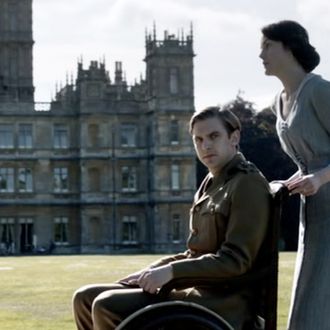
Last week on Downton Abbey, the show’s two war heroes — Matthew Crawley, heir to the Earl of Grantham, and his servant William — were seriously wounded in a German shell attack. William’s injuries proved to be fatal, but Matthew managed to survive the impact, though he has lost the use of his legs, and — more troubling, in certain respects — his penis. As the future Earl, Matthew is responsible for ensuring Downton’s line of inheritance; as the future (God willing) husband to Mary, Matthew is responsible for, to put it in respectable terms, making her his wife. On the show, Matthew has become frustratingly aware of his limitations and is currently refusing to marry anyone, ever. This does not make for very promising romantic television! So, not being medical experts, and being very much in favor of a Matthew-Mary relationship, we became curious about how realistic Matthew’s condition is, and more specifically, whether there’s any chance that he could ever have children, despite his paralysis. To find out, we spoke to Dr. Naomi Kleitman, a specialist in spinal cord injuries and the program director in repair and plasticity at the National Institute of Health.
Before we get to World War I–era science, is it possible for someone today, with this level of body function, to have children?
That’s actually an avid area of research now. The chances are quite good, for a person today with that kind of injury, that he might not be able to have children. The first problem is the actual functions themselves — ejaculation, erection, etc. Some people can have that, because the genital sensory nerves are literally talking to the blood flow, just as a reflex outside of the control of the person. But most often, most of the men with spinal cord injury, even if they could have an ejaculate, it’s likely not to have healthy sperm in it.
But it’s sometimes possible?
There’s a group in Miami that has been studying for a while. Nowadays, using assisted reproduction, in vitro fertilization, there has been some success. Some gentlemen with injuries find they can [procreate] all by themselves. [Dr. Kleitman pointed us to a very instructional fertility booklet from the Miami Project to Cure Paralysis for further reading.]
Now, what about in 1918? This character is paralyzed from the waist down.
Well, that’s not very realistic. The bottom line in World War I — the most likely explanation for this character’s injury would be what we call a complete injury, meaning functionally complete. He can’t send voluntary signals to his legs; he can’t feel legs. He never would have made it home, and if he did, he wouldn’t have survived more than a few weeks. The reason why is he probably would have developed a pressure ulcer [bed sore], which would have gotten infected and probably killed him. And if that didn’t do it, he would have probably gotten a urinary tract infection.
Oh.
Yes. My press office said to me, “It’s a good thing you’re not writing the show.”
Do you have any sense of how often people with these injuries did survive?
[Directs us to an article by Dr. William H. Donovan, “Spinal Cord Injuries - Past, Present and Future.”]
Most of the spinal cord literature on rehab starts with something called the Edwin Smith papyrus, from around 2500 B.C. It’s a compliation of a lot of medical wisdom, basically Egyptian. There’s a very famous passage that details “if you have one who is insensate, cannot move the legs, and his urine dribbles, this is a case not to be treated.”
The entry before this one [in the papyrus] is a person who has some moderate injury, what we would call an incomplete injury, so they have some sensation left. Those are really the only cases that would have survived. The inability to feel is what leads to the pressure sensation problem. If you can’t move, and you can’t feel that you need to move, that will very quickly, within a few days, lead to bed sores. And that’s what killed most people. The science for spinal cord injury actually began in World War II, with a couple of famous surgeons, the development of anesthetics, so surgery was possible, and antibiotics, to treat these infections.
So the outlook is generally not good, from a medical perspective?
The outlook is probably not good for our character to get much improvement over time. If he’s injured the way you say, those tended to be pretty permanent. I’m not saying he can’t, but within the framework of the show, if he’s alive, and he’s surviving the injury, impotence or injury are likely.




